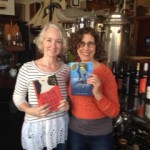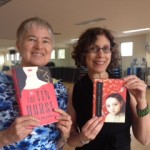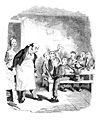 Thank you to J. Dylan Yates, who invited me to follow her on this blog tour. Dylan’s first novel came out just a week ago! Called “The Belief in Angels,” it’s about a young woman growing up in her parents’ wild-hippie household … and fascinated by the stories of her grandfather, a Jewish Holocaust survivor. Dylan and I recently took our blog tour to Cafe Bassam in the Hillcrest neighborhood of San Diego. You can find out more about Dylan and her book here.
Thank you to J. Dylan Yates, who invited me to follow her on this blog tour. Dylan’s first novel came out just a week ago! Called “The Belief in Angels,” it’s about a young woman growing up in her parents’ wild-hippie household … and fascinated by the stories of her grandfather, a Jewish Holocaust survivor. Dylan and I recently took our blog tour to Cafe Bassam in the Hillcrest neighborhood of San Diego. You can find out more about Dylan and her book here.
Doing the tour involves answering four questions, which puts me in mind of the Passover seder.
1. What am I working on? I’m about 200 pages into a new novel, “Tower of Song.” The name is the title of a song by the brilliant, mordant Leonard Cohen. Cohen’s “Tower of Song” is a funny-sad lament about aging, and aging is a theme of my book, which opens with the 50th birthday party of Aaron Rochman. Unlike “The Tin Horse,” which I wrote in the first person from Elaine’s point of view, each member of Aaron’s California Jewish family gets chapters in which we see life through his or her eyes. There’s Aaron, his parents (who are divorced), and his son and daughter, in their twenties.
Another connection with the Leonard Cohen song is that there’s a line about being “born with the gift of a golden voice” – it’s ironic when Cohen croaks it out, but Aaron’s son, Rocky, really does have a golden voice; he’s been trying to make it as a singer-musician, but early in the book, he decides to go to cantorial school. The rest of his very secular family figures he’s just letting go of his pipe dream of stardom and choosing something more practical, but Rocky has found God. That’s just one of the complications I’m having fun with. In fact, my writers group tells me that this book is funny! I didn’t know I could do funny, so I am trying to get used to the idea.
2. How does my work differ from others of its genre? See, this really is like a seder – why is this night different from other nights? There are a lot of great Jewish family novels, but California Jewish family novels? This wasn’t anything I consciously considered when I started “The Tin Horse” – I just wanted write about a minor character in the detective novel “The Big Sleep,” a woman described as having the “fine-drawn face of an intelligent Jewess.” And, because “The Big Sleep” takes place in Los Angeles in the late 30s, my character had to live in that time and place. I had a sense of Jewish immigrant life in the 20s and 30s through fiction and through my family’s stories, but all of those take place “back East,” as we Californians call anywhere east of the Mississippi. (I was surprised when I moved here to learn that my hometown of Milwaukee was “back east.”)
 As I researched L.A.’s Jewish immigrant neighborhood of Boyle Heights, I realized that the Southern California Jewish experience – living in bungalows rather than tenements, having lemon and fig trees in the yard, having the Old Country not just an ocean but an ocean and a continent away – had a particular flavor and character. In my new book, members of the family live up and down the coast – in L.A., a San Diego beach community, the Central Coast, and the Bay area – and I’m doing more with uniquely California settings. (Photo is of jacaranda, which blooms here in April-May.)
As I researched L.A.’s Jewish immigrant neighborhood of Boyle Heights, I realized that the Southern California Jewish experience – living in bungalows rather than tenements, having lemon and fig trees in the yard, having the Old Country not just an ocean but an ocean and a continent away – had a particular flavor and character. In my new book, members of the family live up and down the coast – in L.A., a San Diego beach community, the Central Coast, and the Bay area – and I’m doing more with uniquely California settings. (Photo is of jacaranda, which blooms here in April-May.)
3. Why do I write what I do? This question suggests that there’s a choice, that I could be writing something else. But I’m not one of those writers who has a file of 80 ideas and needs to pick one. One idea grabs me at a time, but it really grabs hard.
4. How does my writing process work? I start by creating a diary for the book, where I put down ideas about characters and relationships, story, research needs, etc. There’s always something to research, and I do some of that before I write anything. At a certain point, I’ll hear the first sentence in my mind. That sentence may not survive as the opening – it didn’t in “The Tin Horse” – but it gets me going. I write in chapters rather than scenes, and I’m a linear writer – I do chapters in the order in which I see them appearing. At times, I do go back and rework an earlier chapter; often, that’s based on getting feedback from my writers’ group and realizing I need to go more deeply into a particular character from the beginning.
Writing habits: My peak creative time is first thing in the morning. When I was writing “The Tin Horse” and juggling a lot of other projects, I’d set a timer for an hour or two, as much time as I could carve out, and make that my sacred writing time. And I mean sacred – if I got up to use the bathroom, I stopped the timer. I’ve always been a keyboard person – I wrote my first story at age 7 when I learned to hunt and peck on the typewriter – and I write primarily on the computer. When I get stuck, though, I find it useful to pick up a pen (a fountain pen, black ink) and handwrite; I think it engages somewhat different neural pathways.
 Next stop on the tour is Carolyn Marsden. Carolyn is the author of 14 novels for young adults and/or middle grade readers. Her books take the reader on a journey to countries and cultures around the world – including Thailand, Iraq, and Czechoslovakia under Communist rule. Carolyn is also a visual artist, and her work is marked by vivid, poetic images. I have the privilege of getting to swim in this evocative language, since Carolyn is a member of my writers group. She’s also one of my Nia students, and we took this photo before class.
Next stop on the tour is Carolyn Marsden. Carolyn is the author of 14 novels for young adults and/or middle grade readers. Her books take the reader on a journey to countries and cultures around the world – including Thailand, Iraq, and Czechoslovakia under Communist rule. Carolyn is also a visual artist, and her work is marked by vivid, poetic images. I have the privilege of getting to swim in this evocative language, since Carolyn is a member of my writers group. She’s also one of my Nia students, and we took this photo before class.

